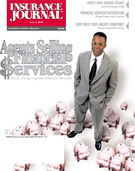The Texas Workers’ Compensation Insurance Fund will become the Texas Mutual Insurance Company Sept. 1 if Gov. Rick Perry signs the bill authorizing the change. The governor has 20 days from the Legislature’s adjournment to sign H.B. 3458. No opposition is expected.
Most observers believe the move will strengthen the state’s workers’ comp insurance fund chiefly by putting a $650 million policyholder surplus out of reach of the State. Most recently the surplus was targeted by State Comptroller Carole Keeton Rylander, whose package of state government fiscal initiatives, e-Texas, released in December 2000, recommended the Fund be sold for at least $300 million, with the proceeds to go to the state Economic Stabilization Fund.
A year earlier, then Gov. George W. Bush proposed that $400 million of the Fund’s surplus be diverted to the state general revenue fund.
According to the Independent Insurance Agents of Texas, Fund President Russell Oliver sees the move as a logical extension of the concept imbedded in the fund’s creation in 1991—that its surplus belongs to policyholders, not to the state government. The IIAT supported this position. Oliver notes that most of the recently-created state funds (New Mexico, Hawaii, Maine, Kentucky), and one of the oldest (Minnesota) are mutual companies.
Strongest opposition to the measure came from the Alliance of American Insurers. While the national trade association representing 326 property/casualty insurance companies, did not object to the Fund becoming a mutual insurance company, it didn’t want the new entity to have a competitive or regulatory advantage over other insurers. The Alliance believes the measure in its present form will result in the new company having a competitive advantage, according to David R. Anderson, Alliance vice president and assistant director of workers compensation and health.
The Alliance notes the fund qualified for a federal tax exemption as a state fund meeting the requirements of the Internal Revenue Code, something private insurers have never had.
The Alliance, which was the only witness to testify against the bill, estimates that this federal tax exemption has saved the Fund approximately $250 million since its 1991 inception, Anderson testified before the Texas Senate Committee on Business and Commerce.
Anderson noted that although the Fund is solely responsible for the burden of the residual workers comp market, it is in very strong financial health, with a premium-to-surplus ratio of 0.4 to 1 at year-end 1999.
“This reflects $600 million of policyholder surplus on premium volume of $232 million, making it among the strongest of all state worker compensation funds,” Anderson testified. “In fact, this ratio far exceeds that of most, if not all, insurers writing workers compensation in Texas.”
“The Alliance is concerned that, given its surplus and tax advantages, the new mutual will gradually force the market share of its competitors lower and lower,” Anderson said. “The net result would be an unhealthy monopoly, ultimately sanctioned, though not intended, by the state of Texas, through HB 3458. This is not an idle fear. We are seeing an advanced stage of this now in Oregon and to a lesser extent in California. Now is the time to address this in Texas,” Anderson testified
The IIAT saw the pivotal issue as how to set aside some of the surplus to accommodate the fund’s continued role as the residual market for high-hazard risks unable to find a home elsewhere. Residual-market business accounted for less than 5 percent of the fund’s premium last year, notes the IIAT, but a tight market could drive up that number quickly.
According to the bill, the Texas Mutual Insurance Company will continue to serve as a competitive force in the workers’ compensation market, to guarantee the availability of workers’ compensation insurance in Texas and to act as the insurer of last resort in Texas. A nine-member board of directors will guide the company. The governor will appoint five members of the board, and the policyholders will elect the remaining four members.
Was this article valuable?
Here are more articles you may enjoy.


 Married Insurance Brokers Indicted for Allegedly Running $750K Fraud Scheme
Married Insurance Brokers Indicted for Allegedly Running $750K Fraud Scheme  US Appeals Court Rejects Challenge to Trump’s Efforts to Ban DEI
US Appeals Court Rejects Challenge to Trump’s Efforts to Ban DEI  Florida Senate President Says No Major Insurance Changes This Year
Florida Senate President Says No Major Insurance Changes This Year  Maine Plane Crash Victims Worked for Luxury Travel Startup Led by Texas Lawyer
Maine Plane Crash Victims Worked for Luxury Travel Startup Led by Texas Lawyer 


